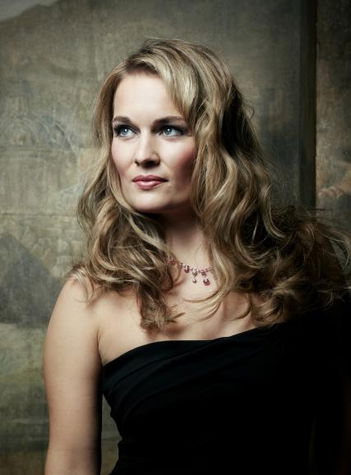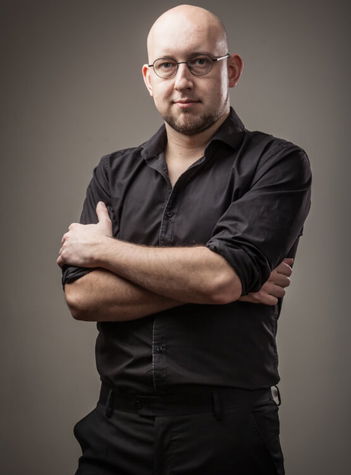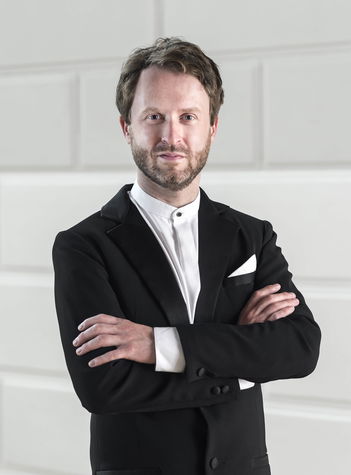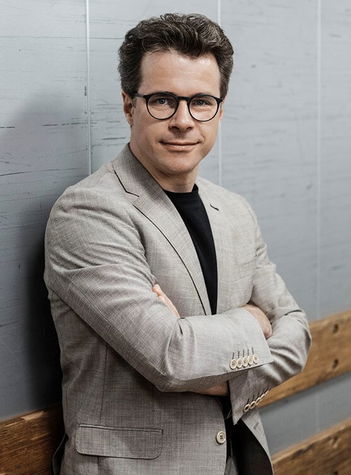Programme
Nikolai Rimsky-Korsakov
Scheherazade, symphonic suite, Op. 35 (42')
— Intermission —
Josef Suk
Epilogue, symphonic composition for orchestra, large and small mixed choir, soprano, baritone, and bass, Op. 37 (40')
Jakub Hrůša and the Czech Philharmonic Youth Orchestra not only see “eye to eye” but hear “ear to ear” as well. After their first collaboration last season, they set out together this time for Arabia of the Middle Ages in Rimsky-Korsakov’s Scheherazade. In the second half of the programme, the Czech Philharmonic and its Principal Guest Conductor join forces with three vocal soloists and the Prague Philharmonic Choir for Josef Suk’s Epilogue, the finale of his symphonic tetralogy.
Subscription series B
Nikolai Rimsky-Korsakov
Scheherazade, symphonic suite, Op. 35 (42')
— Intermission —
Josef Suk
Epilogue, symphonic composition for orchestra, large and small mixed choir, soprano, baritone, and bass, Op. 37 (40')
Alžběta Poláčková soprano
Jiří Brückler baritone
Jan Šťáva bass
Prague Philharmonic Choir
Lukáš Vasilek choirmaster
Czech Philharmonic Youth Orchestra
Jakub Hrůša conductor
Czech Philharmonic
*The Czech Philharmonic Youth Orchestra will play Scheherazade by Rimsky-Korsakov.

Last season, Principal Guest Conductor Jakub Hrůša worked with the Czech Philharmonic Youth Orchestra for the first time and went away not only speaking highly of the players artistic performance but also of the humanity they brought to their music making. In a letter addressed to the Youth Orchestra, he said:
“You played with precision and power, prudence and passion, your heads and your hearts, a clear plan and spontaneity. But the main thing is the human quality I sensed from it. Above and beyond all of that, you are simply great people. I think the most important thing I am now feeling is gratitude that I can return next year as your conductor. I am already looking forward to it.”
For their second series of concerts together, Hrůša has chosen the programmatic suite Scheherazade (1888), Rimsky-Korsakov’s most frequently performed orchestral work which was inspired by the medieval collection of Arabian tales, One Thousand and One Nights. Rather than forming a musical setting for one detailed story, Rimsky-Korsakov’s colourfully orchestrated music depicts instead characters, settings, and scenes from the different individual tales. Listeners will visit a Baghdad marketplace, feel the ardent love of a young prince, and witness a shipwreck on stormy seas.
Epilogue is the final work of Suk’s symphonic tetralogy which the Czech Philharmonic is recording with Jakub Hrůša. Suk began writing sketches for Epilogue in 1920 and made his final revisions in 1933. This extensive composition with a prominent vocal part is one of those great artworks with an intellectual framework which can be described in no other way than as religious and philosophical. The composer himself described the idea behind the work in such a way: “The work goes through the whole of human life, into reflection on death and the dread of it, before the appearance of the song of earthly love, all this leading up to the exhilarating song of liberated mankind. Is death not that for which we are striving, for which humanity shall be striving from eternity to eternity? Without death, life could not be made new and eternal, therefore we have the words of the Holy Scriptures: ‘O death, where is thy sting? O grave, where is thy victory?’”
After the concert on 1st May, we invite you to an aftertalk (in Czech) and autograph session with Jakub Hrůša in the Dvořák Hall.
Alžběta Poláčková soprano

Since 2003, the soprano Alžběta Poláčková has been a soloist with the Opera of the National Theatre in Prague, where she has sung roles spanning from Mozart to the present. Leoš Janáček has a special place in her repertoire; she greatly admires his operas and is often cast in his roles. She has even appeared at the festival in Glyndebourne as Gold-Stripe the Fox in The Cunning Little Vixen. Her other successes abroad include the role of the Second Wood Sprite in a production of Dvořák’s Rusalka at Paris’s Opéra national and the part of Jitka from Smetana’s Dalibor in collaboration with the BBC Symphony Orchestra under the baton of Jiří Bělohlávek.
A graduate of the Academy of Performing Arts in Prague under René Tuček, she has also taken part in numerous international competitions with triumphs, for example, in London at the Anglo-Czechoslovak Trust Competition, and at the Antonín Dvořák International Singing Competition in Karlovy Vary she brought home the National Theatre Prize. She has also taken part in several CD recordings including Janáček’s Eternal Gospel led by Tomáš Netopil; with the trio ArteMiss, she has recorded Shostakovich’s Seven Verses, Op. 127.
Jiří Brückler baritone

A winner of the National Theatre’s Prize for Artists up to Age 35, Jiří Brückler is admired for his “unique voice, in which we hear lyrical warmth with a shade of melancholy and steely power with dramatic potential”. He studied singing at the Prague Conservatoire under the guidance of Jiří Kotouč and at the Academy of Performing Arts in Prague under Roman Janál. He is a winner of the Antonín Dvořák International Singing Competition in Karlovy Vary in the Junior Category.
At the Opera of the National Theatre and the State Opera, where he has been under engagement since 2012, he has performed key roles in operas ranging from Mozart to Britten. For the role of Rodrigo in Verdi’s Don Carlo, he was nominated for the 2013 Thalia Award. He had already been nominated for that prestigious honour four years earlier for the role of Silvio in Leoncavallo’s Pagliacci as a guest at the F. X. Šalda Theatre in Liberec; later, he sang that role at the Český Krumlov International Music Festival alongside José Cura. He is a regular guest at the J. K. Tyl Theatre in Pilsen, the National Theatre in Brno, and the Bulgarian Opera in Sofia. He also appears in the concert repertoire, collaborating with the leading Czech orchestras.
Jan Šťáva bass

The youthful bass Jan Šťáva might still seem to be an “embryonic specimen” of his vocal type, as he referred to himself a few years ago, but he now has more than 100 roles under his belt and many successes both at home and abroad. After graduating from the Janáček Academy of Performing Arts in Brno under Zdeněk Šmukař, he accepted an engagement at the Janáček Opera of the National Theatre in Brno, where he has been heard since 2010 mainly in the repertoire of the 18th and 19th centuries. He also collaborates with the National Moravian-Silesian Theatre in Ostrava. Abroad, he has performed at the Opéra de Paris, the Opéra de Toulon, and the Opéra national de Lorraine in Nancy. He is critically acclaimed both for his vocal quality and his acting talent: “he does not sing a role, but plays it, does not present a part, but lives it, bringing much that is new to the interpretive tradition” (KlasikaPlus, 2018).
He has been heard on the concert stage with such ensembles as the BBC Symphony Orchestra and the Orchestre National de Lyon, and he appears regularly with the Czech Philharmonic at prestigious festivals including the BBC Proms, the Salzburger Festspiele, Prague Spring, and Smetana’s Litomyšl.
Prague Philharmonic Choir
The Prague Philharmonic Choir (PPC), founded in 1935 by the choirmaster Jan Kühn, is the oldest professional mixed choir in the Czech Republic. Their current choirmaster and artistic director is Lukáš Vasilek, and the second choirmaster is Lukáš Kozubík.
The choir has earned the highest acclaim in the oratorio and cantata repertoire, performing with the world’s most famous orchestras. In this country, they collaborate regularly with the Czech Philharmonic and the Prague Philharmonia. They also perform opera as the choir-in-residence of the opera festival in Bregenz, Austria.
Programmes focusing mainly on difficult, lesser-known works of the choral repertoire. For voice students, they are organising the Academy of Choral Singing, and for young children there is a cycle of educational concerts.
The choir has been honoured with the 2018 Classic Prague Award and the 2022 Antonín Dvořák Prize.
Lukáš Vasilek choirmaster

Lukáš Vasilek studied conducting and musicology. Since 2007, he has been the chief choirmaster of the Prague Philharmonic Choir (PPC). Most of his artistic work with the choir consists of rehearsing and performing the a cappella repertoire and preparing the choir to perform in large-scale cantatas, oratorios, and operatic projects, during which he collaborates with world-famous conductors and orchestras (such as the Berlin Philharmonic, the Czech Philharmonic, the Israel Philharmonic, and the Saint Petersburg Philharmonic).
Besides leading the PPC, he also engages in other artistic activities, especially in collaboration with the vocal ensemble Martinů Voices, which he founded in 2010. As a conductor or choirmaster, his name appears on a large number of recordings that the PPC have made for important international labels (Decca Classics, Supraphon); in recent years, he has been devoting himself systematically to the recording of Bohuslav Martinů’s choral music. His recordings have received extraordinary acclaim abroad and have earned honours including awards from the prestigious journals Gramophone, BBC Music Magazine, and Diapason.
Czech Philharmonic Youth Orchestra
In the modern history of the Czech Philharmonic, when the first steps were being taken towards an educational programme, the idea arose in 2006 – while Václav Riedlbauch was still the executive director – of giving symphonic concerts for student audiences, i.e. for a new generation of listeners. The choice fell to the former Prague (later Czech) Youth Orchestra, an ensemble with many years of tradition of a youthful, enthusiastic approach to music. This worked wonderfully because the students in the audience saw their peers on stage. Bound by their love of music, these musicians gave performances from 2006 to 2010 under the leadership of the conductor Marko Ivanović, playing such works as Janáček’s Sinfonietta, Dvořák’s New World Symphony, Cello Concerto, and Te Deum, Mussorgsky’s Pictures at an Exhibition, and Prokofiev’s Romeo and Juliet ballet suite.
When new management took over in 2011, the Czech Philharmonic greatly expanded its educational activities, and that was an opportunity for renewal of the student orchestra’s activities, renamed as the Czech Youth Philharmonic. The idea is to give the rising generation of musicians – mostly students at music schools, whether grammar schools with a music emphasis, conservatoires, or academies of music – the regular opportunity of rehearsing and performing great symphonic, concertante, and choral works. Over time, the efforts turned towards creating a permanent orchestra that would support its members in the perfecting of their ensemble playing and in the creation of long-term relationships and mutual understanding. The Czech Youth Philharmonic musicians also serve as “bearers of light” in relation to their peers by showing them that young people can love classical music and can present it enthusiastically to others.
Since the 2013/2014 season, the orchestra has been performing regularly at concerts of the Czech Philharmonic’s educational series Four Steps to the New World (under the baton of Marko Ivanović), and at the series Penguins at the Rudolfinum (with Vojtěch Jouza) and Who’s Afraid of the Philharmonic? (with Ondřej Vrabec). In April 2019, the Czech Youth Philharmonic appeared with Ida Kelarová and the Čhavorenge children’s choir at Šun Devloro concerts – musical celebrations of International Romani Day. In November 2019, the orchestra played under the baton of Robert Kružík at the Students’ Day Concert with the participation of Joachim Gauck and Petr Pithart.
In June 2020, the conductor Simon Rattle came to Prague insisting that he did not want to conduct just the Czech Philharmonic, but also “some orchestra with young people.” When the choice fell to the Czech Youth Philharmonic, that was an enormous challenge for its members. Sir Simon enjoyed working with the young musicians, and he was unsparing in his praise: “The Czech Youth Philharmonic reminds me of the orchestra of the Verbier Festival, which is made up of the best music students from all around the world, led by players from the Metropolitan Opera. That’s the level they are on.” In February 2021, the Czech Youth Philharmonic first appeared under the baton of chief conductor Semyon Bychkov in the televised concert “A přece se učí” (“But Learning Continues”).
In the 2022/2023 and 2023/2024 seasons, the Czech Youth Philharmonic debuted as part of the Czech Philharmonicʼs subscription concerts with conductors Semyon Bychkov, Giovanni Antonini, and Jakub Hrůša. In the “Steps into the New World” series, young musicians, under the baton of Marko Ivanović, performed works by Bizet, Grieg, Smetana, Vivaldi, Piazzolla, Mussorgsky, and others.
Jakub Hrůša principal guest conductor

Born in the Czech Republic, Jakub Hrůša is Chief Conductor of the Bamberg Symphony, Music Director Designate of the Royal Opera, Covent Garden (Music Director from 2025), and Principal Guest Conductor of the Czech Philharmonic. He was also formerly Principal Guest Conductor of the Orchestra dell’Accademia Nazionale di Santa Cecilia, the Philharmonia Orchestra, and Tokyo Metropolitan Symphony Orchestra.
He is a frequent guest with the world’s greatest orchestras, including the Vienna, Berlin, Munich and New York Philharmonics; Bavarian Radio, NHK, Chicago and Boston Symphonies; Leipzig Gewandhaus, Lucerne Festival, Royal Concertgebouw, Mahler Chamber and The Cleveland Orchestras; Orchestre Philharmonique de Radio France, and Tonhalle Orchester Zürich. He has led opera productions for the Salzburg Festival (Káťa Kabanová with the Vienna Philharmonic in 2022), Vienna State Opera, Royal Opera House, and Opéra National de Paris. He has also been a regular guest with Glyndebourne Festival and served as Music Director of Glyndebourne On Tour for three years.
His relationships with leading vocal and instrumental soloists have included collaborations in recent seasons with Daniil Trifonov, Mitsuko Uchida, Hélène Grimaud, Behzod Abduraimov, Anne Sofie Mutter, Lisa Batiashvili, Joshua Bell, Yefim Bronfman, Rudolf Buchbinder, Gautier Capuçon, Julia Fischer, Sol Gabetta, Hilary Hahn, Janine Jansen, Karita Mattila, Leonidas Kavakos, Lang Lang, Josef Špaček, Jean-Yves Thibaudet, Yuja Wang, Frank Peter Zimmermann, Alisa Weilerstein and others.
As a recording artist, Jakub Hrůša has received numerous awards and nominations for his discography. Most recently, he received the Opus Klassik Conductor of the Year 2023 prize and the ICMA prize for Symphonic Music for his recording of Bruckner’s Symphony No. 4, and the Preis der Deutschen Schallplattenkritik for his recording of Mahler’s Symphony No. 4, both with Bamberg Symphony. In 2021, his disc of Martinů and Bartók violin concertos with Bamberg Symphony and Frank Peter Zimmermann was nominated for BBC Music Magazine and Gramophone awards, and his recording of the Dvořák Violin Concerto with the Bavarian Radio Symphony and Augustin Hadelich was nominated for a Grammy Award.
Jakub Hrůša studied at the Academy of Performing Arts in Prague, where his teachers included Jiří Bělohlávek. He is President of the International Martinů Circle and The Dvořák Society. He was the inaugural recipient of the Sir Charles Mackerras Prize, and in 2020 was awarded both the Antonín Dvořák Prize by the Czech Republic’s Academy of Classical Music, and – together with Bamberg Symphony – the Bavarian State Prize for Music.
Nikolai Rimsky-Korsakov
Scheherazade, symphonic suite, Op. 35
Who hasn’t heard of the folktale collection A Thousand and One Nights? And is there anyone who does not know about the wise storyteller who survived her struggle against evil cruelty? Sultan Shahryār, being convinced that women are deceitful and unfaithful, marries a virgin every day, then each time he has her beheaded the morning after their wedding night. After three years of this horrible barbarism, Scheherazade offers herself voluntarily to be the cruel sultan’s wife, and she asks his permission to tell him a story in the evening. At dawn, her storytelling full of mystery, magic, and adventure has not finished, and because the sultan is curious about how the story will continue, he must postpone the execution. After a period of a thousand and one nights, the beautiful girl Scheherazade not only saves her life in this way, but also manages to soften the heart of the cruel ruler entirely. The sultan finally realizes that by her wisdom, faithfulness, and love, Scheherazade has not only saved herself, but also prevented him from carrying out further acts of evil. It is the sultan’s transformation that constitutes the beautiful finale of the entire four-movement composition that the Russian composer Nikola Rimsky-Korsakov wrote in 1888, giving it the title Scheherazade, a symphonic suite for orchestra, Op. 35. The composer himself conducted the successful premiere in Saint Petersburg that same year. By then, he was already a famed and respected artist who was most strongly drawn to subject matter from folk literature and especially from fairy tales.
In real life, the difficult path Nikolai Rimsky-Korsakov had to follow to fulfil his dreams was like something from a fairy tale. At age 20, he enrolled at a school for naval cadets in Saint Petersburg, and after graduation he sailed around the world on the school’s clipper. In his memoirs, he wrote about the experience in detail, and after his happy return, he evaluated it as follows: “My voyage of foreign seas had ended. From that voyage, which lasted two years and eight months, I came away with many unforgettable memories of the natural beauty of faraway lands and seas and with many negative, harsh, and revolting impressions from naval service. And what is there to say about music and my desire for it?” Fortunately, a much longer section of his memoirs deals with music, and especially with his unique output as a composer.
Just like the collection of Oriental fairy tales, Nikolai Rimsky-Korsakov’s four-movement orchestral suite is full of mystery, magic, and adventure. It begins with a unison fortissimo theme depicting the cruel sultan. Next, we here a violin solo that, according to the composer, “depicts Scheherazade herself as if she were telling her wonderful tales to the terrible sultan.” Scheherazade’s theme appears at important points to join the whole narrative of the individual stories, creating a colourful kaleidoscope of fairytale characters and images of Oriental character: “The program I was guided by in composing Scheherazade consisted of separate, unconnected episodes and pictures from The Arabian Nights, scattered through all four movements of my suite: the sea and Sinbad’s ship, the fantastical narrative of the Kalandar Prince, the Prince and the Princess, the Baghdad festival and the ship dashing against the rock with the bronze rider upon it.” The composer had originally given the individual movements names based on these stories, but he removed the programmatic titles from the printed edition: “For people to go digging around in my composition to find an overly definite programme was not what I wanted.” What was much more important to him was the fact that the music portrayed “various tales of some one person (who happens to be Scheherazade).” The musical theme by which Rimsky-Korsakov depicts Sheherazade is the very embodiment of grace, soaring with natural lightness, radiating a feeling of security and love. At the same time, it makes subtle appearances throughout the work in different moods, provoking more and more curiosity. Its power appears at its fullest at the very end, bringing the peaceable transformation of the sultan’s theme. Once the sultan has finally found reconciliation with the world and with himself, it is in the comforting and tender embrace of Sheherazade.
Josef Suk
Epilogue, a symphonic work for orchestra, large choir, small choir, soprano, baritone, and bass, Op. 37
The Czech composer, violinist, and teacher Josef Suk received his basic musical training from his father, a village teacher. The talented boy then got the best possible education at the Prague Conservatoire, where he first studied violin under Antonín Bennewitz, then composition under Karel Stecker and Antonín Dvořák. This is one reason for the unusual maturity of even Suk’s early works. The popular Serenade for Strings in E flat major, Op. 6 even captivated Johannes Brahms, who recommended the work to his publisher Fritz Simrock, although the composer was just 18 years old. As a recent conservatoire graduate, Suk also had other ambitious; immediately after finishing their studies, Suk and some classmates founded a string quartet, which soon earned recognition at home and around Europe. For a full four decades, Josef Suk played second violin in the Bohemian Quartet, performing on prestigious stages and spending a great deal of time on tour in trains and hotels. It is incredible that with such a busy schedule, he was able to focus on composing. His works were attracting the interest of performers and audiences. And Antonín Dvořák—Suk’s former teacher and now his father-in-law—was now satisfied. For example, Dvořák declared Suk’s incidental music to Zeyer’s play Radúz and Mahulena to be “music from heaven”.
Dvořák died in 1904, and a year later Suk’s wife, Dvořák’s daughter Otilie, died of a heart condition at the age of 27. The heartbroken composer later said: “This sad turn of events also brought a definitive turning point in my creative work, giving rise to a symphony bearing the name of the angel of death Asrael”. He dedicated the Asrael Symphony (1905–1906) “to the sublime memory of Dvořák and Otilie”. He gradually created an entire cycle of compositions dealing with serious questions of human existence. After Asrael he wrote Pohádka léta (A Summer’s Tale, 1907–1909) and Zrání (Ripening, 1912–1917), then in 1920 he began sketching the last part of the cycle: “The Harvest of Love”. Only after he had begun work on the composition did he give it the title Epilogue. Suk wrote the first two parts of the tetralogy for large orchestra only, then at the very end of Zrání he added a small women’s choir. In Epilogue he greatly strengthened the vocal component, adding a mixed choir and three solo voices – soprano, baritone, and bass. He selected the text from the Bible and from Julius Zeyer’s legend Under the Apple Tree. His work on the vast score was often interrupted because he assumed new duties in addition to playing in the quartet: teaching composition at the Prague Conservatoire and taking over as the director of the school. This is another reason why Epilogue was written during the long interval between 1920 and 1929 (with final revisions in 1933). The unique compositions flows without interruption, and it is divided internally into five parts (1. Footsteps, 2. Mothers’ Song, 3. From Eternity to Eternity, 4. Mysterious Wonder and Restlessness, 5. Pilgrim – The Bringer of Consolation). The movement titles do not appear in the score, but the composer revealed the titles and the thoughts behind them to his biographer J. M. Květ: “A man walking about the countryside is contemplating the mysteries of life and death until he is gripped by fear of death nearly to the point of despair. At the moment of greatest desperation, a recollection comes to him of a song sung by his mother, and in the beauty of maternal love he becomes aware of earthly love in its purest form. Deep in thought, he sees a vision of a flame rising from the earth, and in its radiance he envisions mankind’s eternal feelings and desires and the questions of life and death. Under the impression of this revelation, his heart is filled with mysterious wonder and restlessness. Redemption comes in the form of a Pilgrim, an embodiment of universal human desire, who rids men of the fear of death and fills them to their depths with the humble certainty that ‘the spirit of eternal love hovers over us’, and that in death are the seeds of new life.”
In reference to Suk’s humorous comment quoted above, it should be added that unlike Sousedská, his Epilogue definitely requires skill from its performers. At the work’s premiere on 20 December 1933 in Smetana Hall at the Municipal House in Prague, joining with three soloists and three Prague choirs were the Czech Philharmonic augmented by additional players and the conductor Václav Talich, to whom the composer dedicated the work. The President of Czechoslovakia T. G. Masaryk was among those present at the successful premiere.
At the work’s first performance on 20 December 1933 at Smetana Hall of the Municipal House in Prague, the conductor Václav Talich, to whom the composer dedicated the work, led the expanded orchestra of the Czech Philharmonic. President T. G. Masaryk was among those in attendance at the successful premiere.